

What Are Different Types of Poems? Poems are collections of words that express an idea or emotion that often use imagery and metaphor.
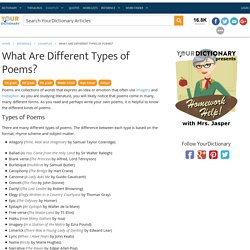
As you are studying literature, you will likely notice that poems come in many, many different forms. As you read and perhaps write your own poems, it is helpful to know the different kinds of poems. 55 Types of Poetry Forms. This article contains the many different poem types.
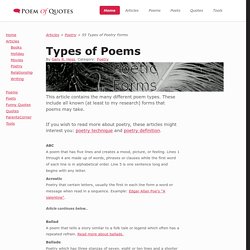
These include all known (at least to my research) forms that poems may take. If you wish to read more about poetry, these articles might interest you: poetry technique and poetry definition. A poem that has five lines and creates a mood, picture, or feeling. Lines 1 through 4 are made up of words, phrases or clauses while the first word of each line is in alphabetical order. Line 5 is one sentence long and begins with any letter. Acrostic Poetry that certain letters, usually the first in each line form a word or message when read in a sequence. Article continues below... Ballad A poem that tells a story similar to a folk tale or legend which often has a repeated refrain. Ballade. Doors poems. Poetry Generator: Create Your Own Poem. Make a Poem! Do it Yourself. Anouk: Scouting Walker At the street Don't know Scouting to Neef Sunday SummerRoof SmilingA animal is Falling Down Meet if I need you somebody FriendLoving you.
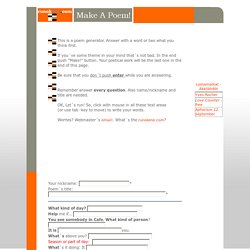
Lora: Flashback crawl away long for my home to go have night fallthe sky is lookinghim is streaming i dont know if i can't see somebody a boyabove you. Nadine: MOD of the Year Macedonia to Sunny Fall is Twix if somebody Intriguing you. Butt Mcgee: my love move with caution to the heart believe in bedroom to share beautiful autumnsong birds beats fastyou is swift and warm like my heart if you can. SMART Teaching Strategies. It is important that students understand the metalanguage of poetry as this provides them with a language for deconstructing poetry and for articulating their interpretation and analysis of poems.
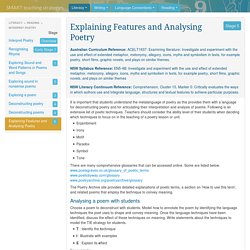
Following is an extensive list of poetic techniques. Teachers should consider the ability level of their students when deciding which techniques to focus on in the teaching of a poetry lesson or unit. EnjambmentIronyMotif Paradox Symbol Tone There are many comprehensive glossaries that can be accessed online. Some are listed below. www.poetsgraves.co.uk/glossary_of_poetic_terms www.poeticbyway.com/glossary www.poetryarchive.org/poetryarchive/glossary The Poetry Archive site provides detailed explanations of poetic terms, a section on 'How to use this term', and related poems that employ the technique to convey meaning. Analysing a poem with students Choose a poem to deconstruct with students. T : Identify the technique I : Illustrate with examples E : Explain its effect Back to top. Giggle Poetry. FizzyFunnyFuzzy: Fun Poetry For Kids. Poetry Teachers. Kenn Nesbitt's Poetry for Kids.
Best-loved-aussie-poems-ballads-songs. Poetry & Poets. Poetry This page covers topics for the Poetry component of English.
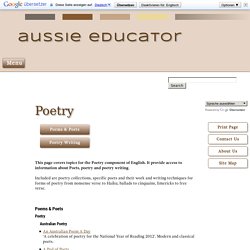
It provide access to information about Poets, poetry and poetry writing. Included are poetry collections, specific poets and their work and writing techniques for forms of poetry from nonsense verse to Haiku, ballads to cinquains, limericks to free verse. Poems & Poets Poetry Australian Poetry An Australian Poem A Day‘A celebration of poetry for the National Year of Reading 2012’.
Children’s Poetry For Australian children’s poetry and poems, see the section above. Classical Poetry 100 Best Poems Ever Written‘Top 100 famous and best poems of all time about life, love and friendship. Love Poems Best Love PoemsBriefly annotated links to multiple sites. eLove PoemsLove poems, Love Quotes. Other Sources 101 Resources for Poets‘There are links for the novice poet, the future poet laureate, the free-time poet, and the browser simply looking to learn more about poetry’.
Showcasing poetry by Australian children's poets. Home - Australian Poetry Library. How I Teach Poetry in the Schools. The focal point of the school, organizationally and mood-wise, is the principal.
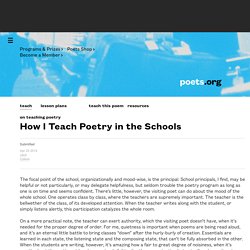
School principals, I find, may be helpful or not particularly, or may delegate helpfulness, but seldom trouble the poetry program as long as one is on time and seems confident. There’s little, however, the visiting poet can do about the mood of the whole school. One operates class by class, where the teachers are supremely important. The teacher is the bellwether of the class, of its developed attention. When the teacher writes along with the student, or simply listens alertly, this participation catalyzes the whole room. On a more practical note, the teacher can exert authority, which the visiting poet doesn’t have, when it’s needed for the proper degree of order.
The acrostic is an admirable form for student use. Write a word vertically, down the paper, and use its letters to begin the lines of a poem that you then make up.